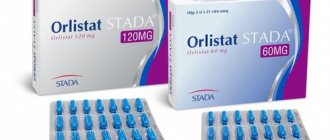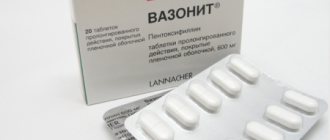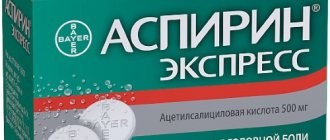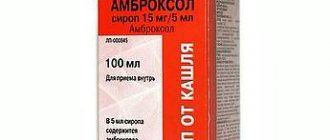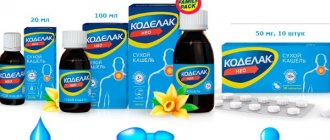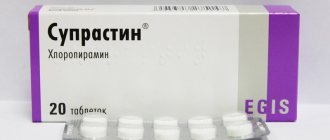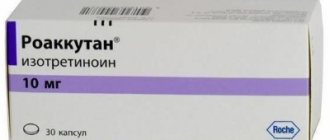The pharmaceutical industry produces various medications that help reduce excess weight. Meridia is considered one of the most famous representatives of this segment. It suppresses appetite and gives a feeling of fullness, so it helps reduce daily caloric intake and lose excess weight.
Release forms and composition of the drug
The production of the medicine takes place in Germany. It is manufactured by the pharmaceutical company Abbott. The drug is released in the form of capsules, which are formed from gelatin. The products are hard to the touch.
The capsule cap is blue, and the body can be yellow or white depending on the concentration of the active substance. The number 10 or 15 is printed on each product, indicating the amount of the active ingredient in it. Inside the gelatin shell contains white powder.
The capsules are packaged in blister packs, which are made from plastic and metal foil. As a rule, one cardboard pack contains 1-2 blisters. The package contains from 14 to 28 tablets.
The main active ingredient in the drug is sibutramine hydrochloride. For the manufacture of capsules it is used in the form of monohydrate. Its concentration depends on the type of drug. The minimum amount of active substance per 1 tablet. is 10 mg.
The drug containing 15 mg per capsule has a stronger effect. When selecting a type of drug, it is important to rely on the opinion of a doctor.
In addition to sibutramine, the medication contains excipients. Their main goals are to give the capsule its shape, preserve the properties of the active ingredient, as well as protect it from environmental influences and possible mechanical damage.
Excipients include:
- titanium dioxide;
- microcrystalline cellulose;
- gelatin and others.
What kind of drug?
Meridia is manufactured in Germany by Knoll AG (Knoll AG 67008 Ludwigshafen Germany), whose products are certified before being put on sale. This is not a dietary supplement, but a full-fledged medication that is designed to combat excessive food consumption, that is, gluttony.
The drug is available in capsules, of two types:
- yellow-blue - their dosage is 10 mg;
- white and blue - their dosage is 15 mg.
Inside the capsules there is a white powder that easily pours out when the lid is opened.
Before the product went on sale, special clinical studies were conducted on its effectiveness. 20,000 volunteers were invited and took Meridia under medical supervision. The results exceeded all expectations:
- with long-term use of the drug (3-6 months) and following a diet, weight loss averaged 10% of the initial body weight;
- after losing weight, the lost kilograms do not return, that is, there is no rebound effect, but study participants who adhered only to a low-calorie diet returned to their initial weight a few months after stopping the diet.
When losing weight by 5% of the initial body weight, the effectiveness of Meridia reaches 86%.
You can buy Meridia in pharmacies. To do this, you must have a prescription from an endocrinologist. The average price is 1400-1500 rubles.
Pharmacological properties
Meridia is a diet pill whose price is explained by its high quality and noticeable effect. When ingested, the gelatin shell of the capsule dissolves, thereby releasing the active component, which begins to be absorbed into the blood. During metabolism, it is converted and broken down into primary and secondary metabolites.
These substances, in turn, slow down the reuptake of a number of hormones:
- serotonin;
- norepinephrine;
- dopamine.
The component has a positive effect on a person, as it relieves him of anxiety and muffles the symptoms of compulsive overeating, which often accompanies obesity.
In addition, these hormones regulate the feeling of fullness, which makes the obsessive desire to snack disappear. It is by suppressing appetite that weight loss occurs. Simultaneously with the loss of kilograms, the concentration of glucose in the body normalizes, which improves the condition of people suffering from diabetes.
Sibutramine also copes with blood fat imbalances and has a positive effect on the lipid profile. Therefore, the drug is recommended for patients with dyslipidemia.
The active substance is easily absorbed into the circulatory system while passing through the digestive tract. Sibutramine reaches its maximum concentration in the body within 1–1.5 hours after administration, and its metabolites - after 3 hours.
Most of the components of the drug (about 90%) are excreted by the kidneys. The remaining amount is excreted from the body in feces. The half-life of the active substance is 1.1 hours, and its metabolites - up to 16 hours.
Instructions:
Clinical and pharmacological group
16.006 (Drug for the treatment of obesity with central action)
Release form, composition and packaging
Hard gelatin capsules, with a yellow body and a blue cap, overprinted “10”; the contents of the capsules are white or almost white, free-flowing powder.
| 1 caps. | |
| sibutramine hydrochloride monohydrate | 10 mg |
Excipients: lactose monohydrate, microcrystalline cellulose, colloidal silicon dioxide, magnesium stearate, indigodine (E132), titanium dioxide (E171), sodium lauryl sulfate, ink (gray), quinoline yellow.
7 pcs. — contour cell packaging (2) — cardboard packs. 14 pcs. — contour cell packaging (1) — cardboard packs. 14 pcs. — contour cell packaging (2) — cardboard packs. 14 pcs. — contour cell packaging (6) — cardboard packs.
Hard gelatin capsules, with a white body and a blue cap, overprinted “15”; the contents of the capsules are white or almost white, free-flowing powder.
| 1 caps. | |
| sibutramine hydrochloride monohydrate | 15 mg |
Excipients: lactose monohydrate, microcrystalline cellulose, colloidal silicon dioxide, magnesium stearate, indigotine (E132), titanium dioxide (E171), gelatin, sodium lauryl sulfate, ink (gray), quinoline yellow.
14 pcs. — contour cell packaging (2) — cardboard packs.
pharmachologic effect
A drug for the treatment of obesity. The therapeutic effect of sibutramine is due to its metabolites, which belong to primary and secondary amines (metabolite M1 and metabolite M2) and are reuptake inhibitors of norepinephrine, serotonin (5-hydroxytryptamine; 5-HT) and dopamine. In human brain tissue, metabolites M1 and M2 suppress the reuptake of norepinephrine and serotonin 3 times more actively than dopamine: 73%, 54%, 16%, respectively.
Sibutramine and its metabolites do not affect the release of monoamines and do not inhibit MAO. They have low affinity for a large number of neurotransmitter receptors, incl. serotonergic (5-HT1, 5-HT1A, 5-HT1B, 5-HT2A, 5-HT2C), adrenergic (β1, β2, β3, α1, α2), dopamine (D1, D2), muscarinic, histamine (H1), benzodiazepine and glutamate NMDA receptors.
In human clinical studies, sibutramine has been shown to reduce body weight by increasing satiety. There is evidence of a connection between the heat-generating effect of the drug and the inhibition of the adaptive slowdown of metabolism during weight loss. Sibutramine-induced weight loss is accompanied by favorable changes in the lipid profile and plasma glucose levels in patients with dyslipidemia and type 2 diabetes mellitus.
Pharmacokinetics
Suction
Sibutramine is well absorbed from the digestive tract and undergoes a significant first-pass effect through the liver. Cmax of the drug in plasma was observed 1.2 hours after a single oral dose of 20 mg of sibutramine.
Distribution and metabolism
Sibutramine is metabolized by the CYP3A4 isoenzyme to demethylated metabolites M1 and M2. Pharmacologically active metabolites M1 and M2 reach Cmax after 3 hours. It has been shown that linear kinetics occurs in the dose range from 10 to 30 mg, and there is no dose-dependent change in T1/2, but there is a directly proportional increase in the concentration of the drug in the blood plasma. With repeated doses of Css metabolites M1 and M2 was achieved within 4 days, and an almost twofold accumulation was observed. The pharmacokinetics of sibutramine and its metabolites in obese patients is similar to that in patients with normal body weight.
The binding of sibutramine and its metabolites M1 and M2 to plasma proteins occurs at levels of approximately 97%, 94% and 94%, respectively.
The primary stage of elimination of sibutramine and its active metabolites M1 and M2 is metabolism in the liver. Other (inactive) metabolites are excreted mainly by the kidneys, as well as through the intestines in a ratio of 10:1.
T1/2 of sibutramine is 1.1 hours, T1/2 of metabolites M1 and M2 is 14 hours and 16 hours, respectively.
Pharmacokinetics in special clinical situations
The relatively limited data currently available do not indicate the existence of clinically significant differences in pharmacokinetics between men and women.
The pharmacokinetics observed in elderly healthy patients (average age 70 years) are similar to those in young patients.
Renal impairment has no effect on the AUC of the active metabolites M1 and M2, except for the M2 metabolite in patients with end-stage renal disease on dialysis. Their endogenous creatinine clearance was approximately 2 times less than in healthy individuals (CL>80 ml/min).
In patients with moderate hepatic impairment, the AUC of active metabolites M1 and M2 was 24% higher after a single dose of sibutramine.
Dosage
The dose is set individually, depending on tolerability and clinical effectiveness. As an initial dose, take 1 capsule of Meridia® 10 mg daily. In patients who respond poorly to taking Meridia® 10 mg (weight loss of less than 2 kg in the first 4 weeks), provided the drug is well tolerated, the daily dose can be increased to 15 mg, i.e. 1 capsule Meridia® 15 mg. In patients who respond poorly to Meridia 15 mg (weight loss of less than 2 kg in the first 4 weeks), further treatment with this drug should be discontinued.
Meridia® capsules should be taken in the morning, without chewing and with a sufficient amount of liquid (a glass of water). The drug can be taken on an empty stomach or combined with meals.
Treatment should not continue for more than 3 months in patients who do not respond well to therapy, i.e. who fail to achieve a 5% reduction in body weight from the initial level within 3 months of treatment. Treatment should not be continued if, during Meridia® therapy, after achieving a reduction in body weight, the patient gains 3 kg or more in body weight. The duration of treatment with Meridia® should not exceed 1 year.
Overdose
There are limited data on sibutramine overdose. The patient should notify his or her physician in the event of a suspected overdose.
The most common adverse reactions associated with overdose: tachycardia, arterial hypertension, headache, dizziness.
Treatment: There is no special treatment or specific antidotes. It is necessary to carry out general measures aimed at maintaining the vital functions of the body: ensure free breathing, monitor the state of the cardiovascular system, and, if necessary, carry out supportive symptomatic therapy. Timely use of activated carbon, as well as gastric lavage, can reduce the intake of sibutramine in the body. Studies in patients with end-stage renal failure on dialysis have shown that sibutramine metabolites are not significantly eliminated by hemodialysis.
Drug interactions
Drugs that inhibit cytochrome CYP3A4
Simultaneous administration of drugs that inhibit the activity of this enzyme, such as ketoconazole, erythromycin, cimetidine in combination with sibutramine, led to an increase in the concentrations of the latter in the blood plasma. Caution should be exercised when using sibutramine simultaneously with drugs that inhibit the activity of cytochrome P450 isoenzymes.
Drugs affecting hemostasis and platelet function
Isolated cases of bleeding have been observed in patients taking sibutramine. Although the causal relationship remains unclear, caution should be exercised when prescribing sibutramine to patients predisposed to bleeding, as well as when using concomitantly with sibutramine other drugs that affect hemostasis or platelet function.
MAO inhibitors
Taking sibutramine simultaneously with MAO inhibitors is contraindicated. Before starting sibutramine therapy, an interval of at least 2 weeks should be maintained after discontinuation of MAO inhibitors. Taking multiple drugs at the same time, each of which increases serotonin levels in the brain, can lead to the development of serotonin syndrome. Serotonin syndrome has rarely occurred during concomitant use of selective serotonin reuptake inhibitors (SSRIs) with certain migraine medications or certain opiates, or when two SSRIs were taken concomitantly. Since sibutramine inhibits serotonin reuptake, it should not be used concomitantly with other drugs that increase serotonin levels in the brain.
Drugs that increase blood pressure and heart rate
Drug interactions with the simultaneous use of sibutramine with drugs that increase blood pressure and heart rate have not been fully studied at present. This group of drugs includes decongestants, cough, cold, and allergy medications that contain ephedrine or pseudoephedrine. Therefore, in cases of simultaneous use of these drugs with sibutramine, caution should be exercised.
Oral contraceptives
Sibutramine does not affect the effect of oral contraceptives.
Drugs affecting the central nervous system
The combined use of sibutramine with weight loss drugs that act on the central nervous system or drugs for the treatment of mental disorders is contraindicated.
Ethanol
No additional deterioration in cognitive and psychomotor reactions was found when taking 20 mg of sibutramine simultaneously with one dose of alcohol (0.5 ml/kg). However, simultaneous use of sibutramine and ethanol is not recommended.
Use during pregnancy and lactation
You should not take Meridia® during pregnancy and lactation (breastfeeding), since to date there is not enough research on the safety of Meridia® effects on the fetus.
Women of childbearing age taking Meridia® should use contraceptive methods.
Side effects
Most often, side effects occur at the beginning of treatment (in the first 4 weeks). Their severity and frequency weaken over time. Side effects are usually mild and reversible.
Side effects, depending on the effect on organs and systems, are presented in the following order: very often (≥ 10%), often (≥1%, <10%).
Very common: insomnia, dry mouth, constipation.
From the side of the central nervous system: often headache, dizziness, anxiety, paresthesia, change in taste.
From the cardiovascular system: often - tachycardia, palpitations, increased blood pressure, vasodilation/hyperemia of the skin with a feeling of warmth. In clinical studies, an increase in systolic and diastolic blood pressure at rest by an average of 2-3 mm Hg was observed. and an increase in heart rate by 3-7 beats/min. Some patients experienced a more significant increase in blood pressure and heart rate. Clinically significant increases in blood pressure and heart rate were mainly observed at the beginning of treatment (first 4-12 weeks). In such cases, treatment should be discontinued.
From the digestive system: often - nausea, exacerbation of hemorrhoids.
From the skin: often - sweating.
Additional adverse reactions have been reported during post-marketing studies and are listed below by organ system.
From the cardiovascular system: atrial fibrillation.
From the hematopoietic system: thrombocytopenia.
From the immune system: allergic hypersensitivity reactions (from moderate skin rashes, itching and urticaria to angioedema / Quincke's edema / and anaphylaxis).
Mental disorders: depression, psychosis, suicidal ideation, suicide and mania. If such conditions occur, the drug must be discontinued.
From the nervous system: convulsions, drowsiness, emotional lability, short-term memory impairment.
From the side of the organ of vision: blurred vision (“veil before the eyes”).
From the digestive system: diarrhea, vomiting, abdominal pain, increased appetite, thirst, reversible increase in the levels of liver enzymes in the blood.
From the skin: alopecia, Henoch-Schönlein purpura.
From the urinary system: acute interstitial nephritis, urinary retention.
From the reproductive system: ejaculation/orgasm disorders, impotence, menstrual irregularities, uterine bleeding.
Other: rhinitis, sinusitis, back pain, flu-like syndrome, peripheral edema, bleeding.
Withdrawal reactions such as headache or increased appetite are rare.
Storage conditions and periods
The drug belongs to the list of potent substances approved by Decree of the Government of the Russian Federation of December 29, 2007 N 964.
The drug should be stored in a dry place, out of reach of children, at a temperature not exceeding 25°C. Shelf life: 3 years.
Indications
— nutritional obesity with a body mass index (BMI) of 30 kg/m2 or more;
- nutritional obesity with a BMI of 27 kg/m2 or more in combination with type 2 diabetes mellitus (non-insulin-dependent) or dyslipoproteinemia.
Contraindications
- presence of organic causes of obesity (for example, hypothyroidism);
- serious eating disorders - anorexia nervosa or bulimia nervosa;
- mental illness;
- Gilles de la Tourette syndrome (chronic generalized tic);
- simultaneous use of MAO inhibitors or their use for 2 weeks before the appointment of Meridia® and 2 weeks after; the use of other drugs acting on the central nervous system that inhibit serotonin reuptake (for example, antidepressants, antipsychotics); sleeping pills containing tryptophan, as well as other centrally acting drugs for weight loss or for the treatment of mental disorders;
- cardiovascular diseases (history and current): ischemic heart disease (angina pectoris, myocardial infarction); decompensated chronic heart failure; occlusive diseases of peripheral arteries; tachycardia, arrhythmia; cerebrovascular diseases (stroke, transient cerebrovascular accident);
— uncontrolled arterial hypertension (BP above 145/90 mmHg);
- thyrotoxicosis;
- severe dysfunction of the liver and/or kidneys;
- benign prostatic hyperplasia;
- pheochromocytoma;
- angle-closure glaucoma;
— established drug, drug or alcohol dependence;
- pregnancy;
- lactation period (breastfeeding);
- children and adolescents up to 18 years of age;
— age over 65 years;
- lactose intolerance, lactase deficiency, glucose-galactose malabsorption;
- established hypersensitivity to sibutramine or other components of the drug.
Carefully
- history of arterial hypertension;
— chronic circulatory failure;
— diseases of the coronary arteries (including a history);
— convulsions (including in history);
- epilepsy;
- impaired liver and/or kidney function of mild to moderate severity, cholelithiasis;
- tendency to bleeding, bleeding disorders, taking drugs that affect hemostasis or platelet function;
- history of motor and verbal tics;
- glaucoma.
special instructions
Meridia® should be used only in cases where all non-drug measures for weight loss are ineffective - if the weight loss over 3 months is less than 5 kg.
To decide whether to take Meridia®, you must consult a doctor, even if you have previously had to contact him on this issue.
Treatment with Meridia® should be carried out as part of complex weight loss therapy under the supervision of a physician with practical experience in the treatment of obesity. Complex therapy includes both changing diet and lifestyle, as well as increasing physical activity. An important component of therapy is the creation of prerequisites for permanent changes in eating habits and lifestyle, which are necessary to maintain the achieved weight loss even after drug therapy is discontinued. As part of therapy with Meridia®, patients need to change their lifestyle and habits in such a way as to ensure that the achieved weight loss is maintained after completion of treatment. Patients should be clear that failure to comply with these requirements will lead to repeated weight gain and repeated visits to their doctor.
In patients with comorbidities associated with obesity, it is recommended to continue treatment only if weight loss is combined with clinical improvement in other parameters, for example, with an improvement in the lipid profile in patients with dyslipidemia or an improvement in the glycemic profile in patients with diabetes mellitus.
In some patients, sibutramine leads to a significant increase in blood pressure and/or an increase in heart rate. Patients taking Meridia® should regularly measure their blood pressure and heart rate. In the first 3 months of treatment, these parameters should be monitored every 2 weeks, from the 4th to the 6th month - once a month, and then regularly, but at least once every 3 months. If during two consecutive visits an increase in heart rate ≥ 10 beats/min or systolic/diastolic blood pressure ≥ 10 mmHg is detected, treatment should be discontinued. In patients whose blood pressure exceeded 145/90 mmHg twice during repeated measurements, treatment with Meridia® should be discontinued.
In patients with sleep apnea syndrome, it is necessary to especially carefully monitor blood pressure levels.
Although a connection has not been established between taking sibutramine and the development of primary pulmonary hypertension, however, given the well-known risk of drugs in this group, with regular medical monitoring it is necessary to pay special attention to symptoms such as progressive dyspnea (breathing difficulty), chest pain and swelling in the legs .
There is usually an increased risk of bleeding when taking sibutramine and other serotonin reuptake inhibitors together. In patients predisposed to bleeding or taking drugs that affect hemostasis or platelet function, sibutramine should be used with caution.
If you miss a dose of Meridia®, you should not take a double dose of the drug at the next dose; it is recommended to continue taking the drug according to the prescribed regimen.
The duration of taking Meridia® should not exceed 1 year.
Although there is no clinical evidence of addiction to sibutramine, you should find out if the patient has a history of drug dependence and pay attention to possible signs of drug abuse.
Impact on the ability to drive vehicles and operate machinery
Drugs that affect the central nervous system can limit mental activity, memory and reaction speed. And although in studies sibutramine did not affect these functions, nevertheless, taking Meridia® may limit the ability to drive vehicles and operate machinery.
During the treatment period, care must be taken when driving vehicles and engaging in other potentially hazardous activities that require increased concentration and speed of psychomotor reactions.
Use for renal impairment
Prescribe with caution for mild to moderate renal dysfunction.
In case of severe renal impairment, the drug is contraindicated.
Use for liver dysfunction
Prescribe with caution for mild to moderate liver dysfunction.
In case of severe liver dysfunction, the drug is contraindicated.
Conditions for dispensing from pharmacies
The drug is available with a prescription.
How do pills affect the process of losing weight?
The drug starts the process of weight loss by suppressing appetite. Capsules create a feeling of fullness, so the body's need for food decreases. A person taking the drug experiences virtually no obsessive desire to snack, and the feeling of satiety from food is much stronger.
Meridia is a diet pill whose price is high, but is fully justified by its effectiveness. The effect of the drug, based on the properties of sibutramine metabolites, is also aimed at the human nervous system. It prevents the process of monoamine reuptake, which increases the concentration of hormones such as serotonin and dopamine in the body, which:
- suppress feelings of anxiety;
- increase the level of vigor;
- improve overall well-being.
Thus, the drug helps not only to reduce body weight, but also to treat nervous system disorders that often accompany obesity and are its main cause.
According to reviews, losing weight with the help of medication can achieve impressive results. So, with regular use of the drug, a person loses up to 5 kg per month. With a standard course of therapy, which is 12 weeks, you can lose about 15 kg.
Interactions of the drug Meridia
Sibutramine and its metabolites are eliminated by hepatic metabolism. The main enzyme involved in their metabolism is CYP 3A4, but CYP 2C9 and CYP 1A2 may also be involved. Caution must be exercised when using sibutramine simultaneously with drugs that affect the activity of the CYP3A4 enzyme. CYP3A4 inhibitors include ketoconazole, intraconazole, erythromycin, clarithromycin, troleandomycin and cyclosporine. Simultaneous administration of ketoconazole or erythromycin with sibutramine led to an increase in the concentration of sibutramine metabolites in the blood plasma (by 23 and 10%, respectively). Heart rate increased by an average of 2.5 beats/min compared to the use of sibutramine alone. Rifampicin, phenytoin, carbamazepine, phenobarbital and dexamethasone induce the CYP3A4 enzyme and may accelerate the metabolism of sibutramine, although this has not been studied experimentally. The simultaneous use of several drugs that increase serotonin levels in the blood can lead to serious interactions. The so-called serotonin syndrome can develop in isolated cases with the simultaneous use of selective serotonin reuptake inhibitors with certain drugs for the treatment of migraine (sumatriptan, dihydroergotamine) or with certain opioids (pentazocine, pethidine, fentanyl, dextromethorphan), or in the case of the use of 2 reuptake inhibitors serotonin at the same time. Since sibutramine blocks the reuptake of serotonin, it should not be prescribed with drugs of similar action, as well as with drugs that increase the level of serotonin in brain tissue. Drug interactions with simultaneous use of Meridia with drugs that increase blood pressure and heart rate (for example, sympathomimetics) have not been sufficiently studied. These medications include some cough and cold medications, allergy medications, decongestants (eg, ephedrine, pseudoephedrine), and some decongestants (eg, xylometazoline). Therefore, in the case of simultaneous use of such drugs, caution should be exercised. The drug does not affect the effectiveness of oral contraceptives. With a one-time simultaneous use of sibutramine and alcohol, no increase in the negative effect of the latter was noted. There are no data regarding the use of Meridia with orlistat. MAO inhibitors can be taken no earlier than 2 weeks after stopping sibutramine.
Indications for use
The drug is used primarily in the treatment of obesity. It is prescribed for diseases of a nutritional nature. This type of obesity is associated with a lack of balance in the patient’s diet, metabolic disorders, and excessive accumulation of subcutaneous fat.
The main indication for the use of the drug is a high body mass index. Basically, the medication is prescribed for obesity of 1, 2 and 3 degrees, when the BMI value exceeds 30 kg/m2.
However, it is possible to use the drug at lower levels. Thus, capsules are used to get rid of excess weight (with a BMI above 27 kg/m2) if the patient has diabetes mellitus or dyslipoproteinemia.
In any case, the possibility of using the drug is determined exclusively by a specialist. Only a doctor can determine the permissible dosage and course of treatment. Self-administration of the drug, without prior consultation with a professional, increases the risk of side effects and deterioration of well-being during therapy.
pharmachologic effect
A drug for the treatment of obesity. The therapeutic effect of sibutramine is due to its metabolites, which belong to primary and secondary amines (metabolite M1 and metabolite M2) and are reuptake inhibitors of norepinephrine, serotonin (5-hydroxytryptamine; 5-HT) and dopamine. In human brain tissue, metabolites M1 and M2 suppress the reuptake of norepinephrine and serotonin 3 times more actively than dopamine: 73%, 54%, 16%, respectively.
Sibutramine and its metabolites do not affect the release of monoamines and do not inhibit MAO. They have low affinity for a large number of neurotransmitter receptors, incl. serotonergic (5-HT1, 5-HT1A, 5-HT1B, 5-HT2A, 5-HT2C), adrenergic (β1, β2, β3, α1, α2), dopamine (D1, D2), muscarinic, histamine (H1), benzodiazepine and glutamate NMDA receptors.
In human clinical studies, sibutramine has been shown to reduce body weight by increasing satiety. There is evidence of a connection between the heat-generating effect of the drug and the inhibition of the adaptive slowdown of metabolism during weight loss. Sibutramine-induced weight loss is accompanied by favorable changes in the lipid profile and plasma glucose levels in patients with dyslipidemia and type 2 diabetes mellitus.
Contraindications
Meridia is a diet pill whose price is justified by its high quality. However, the use of the drug must be treated with caution, since there are a number of restrictions and contraindications. In certain situations, sibutramine is dangerous to health, so before starting to use the medication, consultation with a doctor is required.
You should stop using capsules for the following diagnoses:
- diseases caused by mental disorders;
- thyrotoxicosis;
- angina pectoris;
- angle-closure glaucoma;
- eating disorders (bulimia, anorexia);
- hypothyroidism;
- diseases associated with impaired renal function;
- pheochromocytoma;
- uncontrolled arterial hypertension;
- myocardial infarction;
- chronic generalized tic;
- stroke.
It is prohibited to use the drug during pregnancy. To date, there is no accurate data on the effect of the active substance on the growth and development of the fetus, so it is important for women expecting the birth of a child to stop using capsules. It is also not recommended to use the medication while breastfeeding, since there is a possibility of excretion of the active component in milk.
It is important for people with:
- epilepsy;
- tendency to bleeding;
- glaucoma and other diseases.
There is a high risk of complications and side effects, so Meridia should be taken under the supervision of a doctor and taking into account his recommendations.
Contraindications to the use of Meridia
- hypersensitivity to sibutramine or any of the components of the drug;
- obesity caused by organic pathology;
- known or established serious eating disorders: psychogenic eating disorders Anorexia nervosa (anorexia nervosa) or Bulimia nervosa (excessive food cravings);
- mental illness;
- Gilles de la Tourette syndrome;
- simultaneous use (or use within the last 2 weeks) of MAO inhibitors or other centrally acting drugs for the treatment of mental disorders (for example, antidepressants, antipsychotics, etc.), sleep disorders (tryptophan) or drugs for weight loss;
- history of coronary artery disease, chronic heart failure, occlusive diseases of peripheral arteries, tachycardia, arrhythmia, cerebrovascular diseases (stroke, transient cerebrovascular accident);
- the presence of inadequately controlled hypertension (arterial hypertension) (BP 145/90 mm Hg);
- hyperthyroidism;
- severe liver dysfunction;
- severe renal impairment, including in patients with end-stage renal failure on dialysis;
- benign prostatic hyperplasia (with the presence of residual urine);
- pheochromocytoma;
- angle-closure glaucoma;
- drug, drug or alcohol addiction;
- During pregnancy and breastfeeding;
- children under 18 years of age and patients over 65 years of age due to the lack of sufficient clinical experience.
At what age can the drug be used?
The use of the medication by persons under 18 years of age is not permitted. The drug is used exclusively for the treatment of obesity in adults. If it is necessary to select a drug for children or adolescents, they should consult a doctor and discuss this issue with him.
There are also age restrictions for adult patients. It is not recommended to use the drug in the treatment of obesity in people over 65 years of age.
This is due to age-related changes occurring in the body, deterioration of the functioning of the gastrointestinal tract, and a slowdown in metabolism. When elderly people use capsules, the risk of complications, deterioration in general well-being, and serious side effects increases.
Instructions for use, dosage for weight loss
Meridia is a diet pill whose price corresponds to its high quality. To achieve the desired effect, it is important to follow the regimen of taking the drug and its dosage. The course of treatment and the maximum permissible daily dose of the drug can only be determined by a doctor familiar with the characteristics of the patient’s health condition.
The standard dose offered by drug manufacturers is 10 mg. Depending on the person's response to sibutramine, this amount may change during therapy.
So, if, when taking 10 mg of the active component per day, the patient managed to lose less than 2 kg in a month, it is possible to increase the daily norm to 15 mg. If the increased dose also does not give the desired result, it is necessary to stop using the drug.
Taking the medication does not depend on food intake, so you can take the capsule on an empty stomach, after or during meals. It is best to take the drug in the morning. The capsule must be swallowed with a glass of clean water. There is no need to chew or break the product.
Pharmacokinetics
Suction
Sibutramine is well absorbed from the digestive tract and undergoes a significant first-pass effect through the liver. Cmax of the drug in plasma was observed 1.2 hours after a single oral dose of 20 mg of sibutramine.
Distribution and metabolism
Sibutramine is metabolized by the CYP3A4 isoenzyme to demethylated metabolites M1 and M2. Pharmacologically active metabolites M1 and M2 reach Cmax after 3 hours. It has been shown that linear kinetics occurs in the dose range from 10 to 30 mg, and there is no dose-dependent change in T1/2, but there is a directly proportional increase in the concentration of the drug in the blood plasma. With repeated doses of Css metabolites M1 and M2 was achieved within 4 days, and an almost twofold accumulation was observed. The pharmacokinetics of sibutramine and its metabolites in obese patients is similar to that in patients with normal body weight.
The binding of sibutramine and its metabolites M1 and M2 to plasma proteins occurs at levels of approximately 97%, 94% and 94%, respectively.
The primary stage of elimination of sibutramine and its active metabolites M1 and M2 is metabolism in the liver. Other (inactive) metabolites are excreted mainly by the kidneys, as well as through the intestines in a ratio of 10:1.
T1/2 of sibutramine is 1.1 hours, T1/2 of metabolites M1 and M2 is 14 hours and 16 hours, respectively.
Pharmacokinetics in special clinical situations
The relatively limited data currently available do not indicate the existence of clinically significant differences in pharmacokinetics between men and women.
The pharmacokinetics observed in elderly healthy patients (average age 70 years) are similar to those in young patients.
Renal impairment has no effect on the AUC of the active metabolites M1 and M2, except for the M2 metabolite in patients with end-stage renal disease on dialysis. Their endogenous creatinine clearance was approximately 2 times less than in healthy individuals (CL>80 ml/min).
In patients with moderate hepatic impairment, the AUC of active metabolites M1 and M2 was 24% higher after a single dose of sibutramine.
Side effects
If you independently exceed the daily dose, ignore the requirements of the manufacturers or the attending physician, as well as the contraindications indicated in the instructions, the risk of side effects increases.
According to reviews, they manifest themselves in the form of the following symptoms:
- insomnia;
- increased blood pressure;
- sweating;
- depression;
- diarrhea;
- dry mouth;
- tachycardia;
- nausea;
- menstrual irregularities;
- constipation;
- psychosis;
- drowsiness;
- sinusitis;
- various allergic reactions;
- convulsions.
The occurrence of side effects is normal and should not cause concern in the first month of taking the drug. Over time, their intensity decreases and symptoms occur less frequently. You should consult a doctor if side effects significantly reduce your quality of life or do not go away after 4 weeks of taking the medication.
After discontinuation of the drug, the patient may experience a headache for a short time. In rare cases, appetite increases sharply.
Side effects of Meridia
Most often, side effects occur at the beginning of treatment (in the first 4 weeks). Their severity and frequency decrease over time. Side effects were generally mild and reversible and did not require discontinuation of treatment. Side effects observed in clinical trials are presented below depending on the effect on organs and organ systems (very often 10%, often 1-10%).
Organ and system | Frequency | By-effect |
| The cardiovascular system | Often | Tachycardia, palpitations Increased blood pressure Vasodilation (skin hyperemia with a feeling of warmth) |
| Digestive system | Often | Constipation |
| Often | Nausea Exacerbation of hemorrhoids | |
| CNS | Often | Dry mouth Insomnia |
| Often | Headache Dizziness Anxiety Paresthesia (impaired skin sensitivity) | |
| Leather | Often | Excessive sweating |
| Sense organs | Often | Change in taste |
Changes in the cardiovascular system An increase in systolic and diastolic blood pressure at rest was observed, on average by 2–3 mm Hg. Art., as well as increased heart rate by an average of 3–7 beats/min. In isolated cases, a greater increase in blood pressure and increased heart rate cannot be ruled out. Typically, a clinically significant increase in blood pressure and increased heart rate occurs in the early stages of treatment (the first 4–12 weeks). In such cases, therapy should be discontinued. Clinically significant side effects that were observed in clinical studies and during post-marketing surveillance are listed below. Blood and lymphatic system disorders: thrombocytopenia, Henoch-Schönlein purpura. Cardiovascular disorders: atrial fibrillation, paroxysmal supraventricular tachycardia. Immune system disorders: allergic hypersensitivity reactions from minor skin rash and urticaria to angioedema and anaphylaxis. Mental disorders: cases of depression, psychosis, mania, suicidal thoughts and suicide have been rarely reported (a cause-and-effect relationship between their occurrence and the use of sibutramine has not been established). In this case, it is recommended to stop treatment with sibutramine. Nervous system disorders: convulsions, serotonin syndrome when used in combination with other drugs that affect the release of serotonin, transient short-term memory disorder. Visual impairment: blurred vision. Gastrointestinal disorders: diarrhea, vomiting, gastrointestinal bleeding. Skin and subcutaneous tissue disorders: alopecia, skin rash, urticaria, skin reactions accompanied by bleeding (ecchymoses, petechiae). Renal and urinary tract disorders: acute interstitial nephritis, mesangiocapillary glomerulonephritis, urinary retention. Reproductive system disorders: ejaculation/orgasm disorders, impotence, menstrual irregularities, uterine bleeding. Laboratory data: transient increase in liver enzyme levels. Other: Very rarely, withdrawal symptoms such as headache and increased appetite may occur.
Overdose
Meridia should be taken strictly in the dosage prescribed by a specialist. If a person suspects that he has taken diet pills in excess of the norm, it is important to notify the doctor about this in order to timely prevent possible consequences.
The price of a drug overdose is a deterioration in health and the manifestation of some side effects, such as:
- tachycardia;
- headache;
- arterial hypertension;
- dizziness.
In case of an overdose of a drug, it is important to provide the patient with all the conditions to maintain the normal functioning of the internal organs. In particular, the state of the cardiovascular system and breathing are monitored. It is important to rinse the stomach using activated charcoal. If necessary, carry out symptomatic therapy.
Overdose of Meridia, symptoms and treatment
There is limited experience with sibutramine overdose. Adverse reactions that were observed most often and were associated with overdose included tachycardia, increased blood pressure, headache and dizziness. Treatment should include the general measures used to treat overdose: monitoring of respiratory and cardiovascular activity and general symptomatic and supportive measures. Early use of activated carbon may reduce the absorption of sibutramine. Gastric lavage may also be necessary. In patients with elevated blood pressure or tachycardia, careful use of β-adrenergic blockers may be indicated. The results of a study in patients with end-stage kidney disease on dialysis showed that sibutramine metabolites are practically not eliminated by hemodialysis.
special instructions
The medication is used strictly under the supervision of the attending physician. Consultation with a specialist before starting a new course of treatment is necessary, even if the drug was used previously for the same diagnosis.
It is important to take sibutramine seriously due to the large number of side effects and contraindications. The drug is prescribed only when all other means have failed to seriously affect weight. The medication is considered ineffective if the patient managed to lose less than 5 kg after 3 months of taking it.
Meridia is only part of the treatment for obesity. For full treatment, it is also necessary to form new, healthy eating habits in a person and increase the level of physical activity.
If attempts to get rid of the disease are limited only to taking the drug, the lost kilograms will return within a few weeks after the end of the course. Proper nutrition and exercise will help consolidate the results.
Special instructions for the use of Meridia
Meridia should be taken only in cases where all other measures to reduce body weight have been ineffective, that is, if the decrease in body weight (or its stabilization) over 3 months was ≤5%. Treatment with Meridia should be carried out as part of complex therapy for weight loss under the supervision of a physician with practical experience in the treatment of obesity. Complex therapy includes changing diet and lifestyle, and increasing physical activity. An important component of therapy is the creation of prerequisites for permanent changes in eating habits and lifestyle, which are necessary to maintain the achieved level of body weight after discontinuation of drug treatment. Patients should be clearly aware that failure to comply with these requirements will lead to weight gain again, so even after stopping treatment they should be under medical supervision. In all patients taking the drug Meridia, it is necessary to monitor blood pressure levels and pulse rate: in the first 3 months of treatment - every 2 weeks, during the 4-6th month of treatment - once a month and then regularly, but at least once a month. 3 months Treatment with the drug should be discontinued in patients whose heart rate at rest increased by more than 10 beats/min or systolic/diastolic blood pressure increased by more than 10 mmHg twice during repeated measurements. Art. In patients whose blood pressure levels exceeded 145/90 mm Hg twice during repeated measurements. Art., treatment with Meridia should be discontinued. Blood pressure should be monitored especially carefully in patients with sleep apnea. Although a link between taking sibutramine and the development of primary pulmonary hypertension has not been established, during regular medical monitoring it is necessary to pay special attention to symptoms such as progressive shortness of breath, chest pain and the appearance of peripheral edema. The patient should be informed of the need to immediately consult a doctor if such symptoms occur. In patients with epilepsy, the drug should be used with extreme caution. Studies conducted in patients with mild to moderate renal impairment showed an increase in the concentration of sibutramine in the blood plasma. No side effects of the drug were noted, however, Meridia should be used in such patients with extreme caution. Despite the fact that only inactive metabolites are excreted by the kidneys, Meridia should be prescribed with caution to patients with mild or moderate renal impairment. The drug should be used with caution in patients with a family history of motor or verbal tics (stuttering). There is a potential for abuse of drugs that act on the central nervous system. However, available clinical data do not support abuse of sibutramine. The use of certain anti-obesity drugs is associated with an increased risk of developing cardiac valvulopathy. However, there is no evidence based on clinical data of an increase in the number of such cases with the use of sibutramine. There are no data regarding the use of sibutramine in the treatment of patients with compulsive eating disorders. Sibutramine should be prescribed with caution to patients with open-angle glaucoma and patients with a risk of increased intraocular pressure (for example, a family history). As with the use of serotonin reuptake inhibitors, there is a potential risk of bleeding (including gynecological, gastrointestinal and other types of cutaneous or mucous membrane bleeding) in patients taking sibutramine. Therefore, sibutramine should be used with caution in patients prone to bleeding or in those who are simultaneously taking medications that affect hemostasis or platelet function. Particular attention should be paid to patients with a history of depression. If signs or symptoms of depression occur, consider discontinuing sibutramine and initiate appropriate therapy. During pregnancy and breastfeeding. During pregnancy and breastfeeding, the use of the drug is contraindicated. Women of reproductive age when using sibutramine should use adequate methods of contraception during treatment and for 5 weeks after stopping use of sibutramine. Children. The drug should not be used in children under 18 years of age. Impact on the ability to drive vehicles and operate other machinery. Drugs that affect the central nervous system can limit mental activity, memory, and reaction speed. Although sibutramine did not affect these functions in studies in healthy volunteers, use of Meridia may limit the ability to drive or operate machines.
Drug interactions
The drug should be prescribed with caution to people taking the following types of medications:
- cytochrome CYP3A4 inhibitors;
- drugs to increase blood pressure;
- monoamine oxidase inhibitors;
- means to increase heart rate.
Meridia
The use of Meridia is strictly contraindicated if the patient is being treated with drugs that affect the functioning of the central nervous system. It is also not recommended to use capsules simultaneously with ethanol-containing products.
Analogs
The drug can be replaced with similar drugs containing sibutramine. However, before starting to take them, consultation with a specialist is necessary.
| Name | Release form | Indications | Cost in rub. |
| Goldline | capsules | nutritional obesity | 1250–2300 |
| Slimia | capsules | 1300–2500 | |
| Reduxin | capsules, tablets | 1700–2800 | |
| Lindaxa | capsules | 1500–2700 |
Terms, conditions of sale and storage
The drug is sold only with a prescription from a doctor. It is impossible to purchase it freely. This is due to the fact that sibutramine is a potent component.
The medicine can be stored for 3 years. It is not recommended to leave it in damp places. Contact of sunlight with the medication should be avoided. The optimal temperature for storing capsules is no higher than 25°C. If there are children in the house, it is important that they do not have access to the drug to avoid accidental ingestion.
Price
The cost of the drug depends on its type. Thus, a medicine with a concentration of the active substance of 10 mg will cost less than capsules with 15 mg of the component. Depending on the pricing policy of a particular pharmacy, the cost of the drug can range from 1,500 to 3,600 rubles. per pack.
Meridia is an effective diet pill that is used in the fight against obesity and overweight. Its high price is justified by its quality and fast action. Before you start taking capsules, it is important to consult your doctor.

